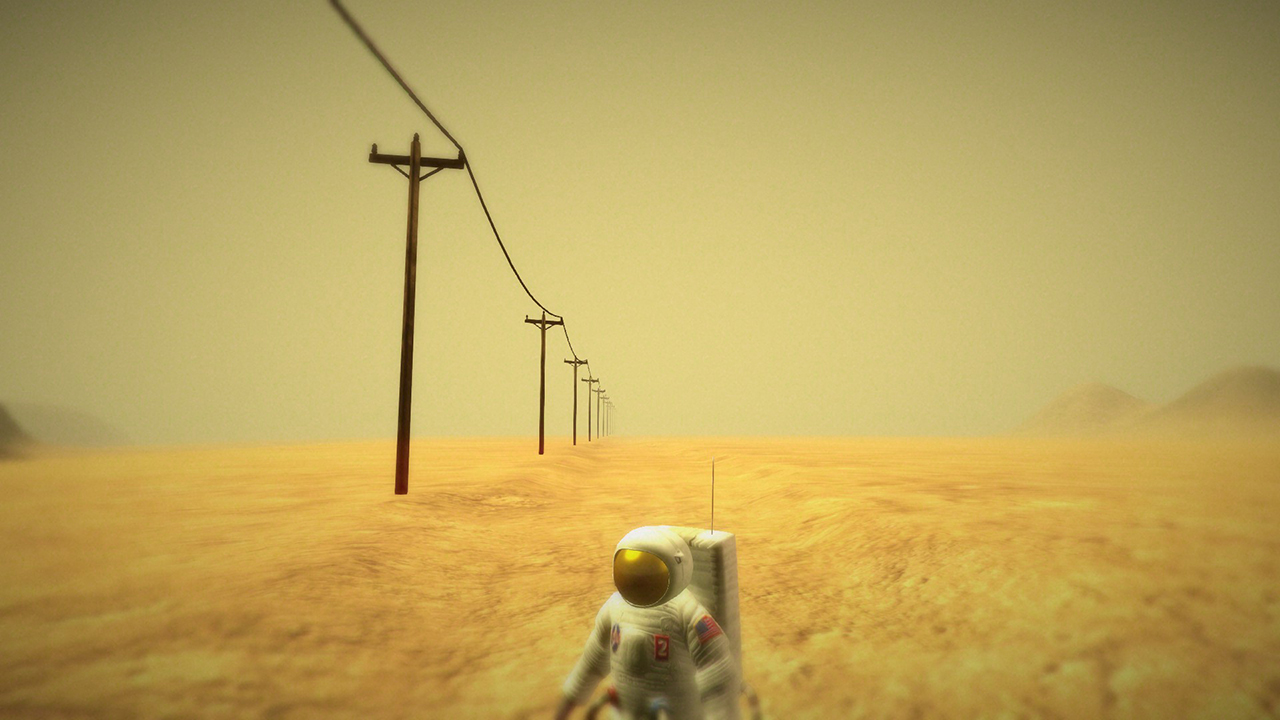ANIMAL’s feature Game Plan asks game developers to share a bit about their process and some working images from the creation of a recent game. This week, we spoke with David Board of Stage 2 Studios about Lifeless Planet, a game that draws equally from Mario and The Twilight Zone.
David Board watched a lot of pulpy, black and white sci-fi growing up. “Sometimes that’s all that was on TV,” he told ANIMAL. “Plus I grew up in West Virginia so sometimes you’d get these crazy old-timers telling stories about weird people they saw out in the woods, and they turned around and they were gone.”
“I’m a skeptic to the core,” he continued. “Having said that, I love to death hearing crazy stories of the paranormal and Bigfoot and all that. Not because I give it one ounce of credence, but there’s just something fun about the ghost story around the campfire with the crazy twist at the end.”
Lifeless Planet has that twist and more. It begins with a crash landing in a barren red desert on a planet 30 light years away from Earth. Your crew is missing, your oxygen is depleting, your ship is wrecked, and this is not what you signed up for. This planet was supposed to be lush and green, and instead it appears lifeless. Until you see the telephone poles standing at attention in a row that stretches to the horizon, at least.
Board wasn’t seeing the type of sci-fi he loved growing up reflected in the video games he was playing as an adult. “As often as space is a theme in video games, I can’t think of too many semi-hard sci-fi experiences, like traveling to other planets, where you’re not a space marine shooting everything in sight,” he said. So he took matters into his own hands.
Lifeless Planet is filled with sci-fi tropes: an enigmatic green-glowing woman, hostile alien life, a mysterious energy source, deadly vegetation that springs from the soil to impale and trap, power-hungry Communists, hallucinations of a hospital room back home — these and more play out over the game’s several hours. It’s not the prettiest game, its puzzles aren’t the most engaging, and its jumping mechanics — much as Board would have liked it to feel like a classic 90s Mario game — aren’t quite up to snuff. But with every new twist it gets its hooks in you a little deeper, and none of that matters in the end.
Board worked on Lifeless Planet for three years while doing additional software development work to stay afloat. Others helped with the game’s beautiful score (composed by Rich Douglas), its voice-acting (English, Russian and otherwise), and some writing; an incomplete version released to the masses provided Board with as many “testers” as he could have wanted, and Kickstarter backers shared plenty of feedback as well. But Board crafted the rest of the game — from its story to the nitty-gritty programming — himself.

Unsurprisingly it all began with the astronaut (Board’s company, Stage 2, is named after the second stage of a rocket NASA launched toward Saturn in 1969). He developed the character to star in a mobile game, but Board realized eventually that what he had created had the potential to be bigger.
“I’ve just always enjoyed that storytelling that to me says more about the human psyche than about reality, although I also sort of agree with Lovecraft’s perspective that as much as we can know about the world, we still experience it through fleshy eyeballs and brain, whatever that is. We are literally animals,” he said. “As much as we like to reason and analyze and be scientific — and I love that stuff — there is this whole other psychology of being human — that the world is just never going to be fully understood.”
 Board’s workspace in Alaska
Board’s workspace in Alaska Board recently moved to Seattle, driving over 2,200 miles from his former home in Alaska. He said living in the Great White North only increased his obsession with outer space, reminding him day after day that we’re just floating around on one rock among many. In Alaska, “the sun doesn’t come up and go across the top of the sky, high noon, and then set on the other side. It circles around you, even in the summer,” he said. “For most of us, Planet Earth is our job and 9 to 5 — and believe me, I get wrapped up in all that stuff too — but Alaska really drives home the reality of our existence.”
One of Lifeless Planet’s most powerful aspects is the comatose wife the game’s astronaut left behind on Earth. He’s arranged for her to be taken care of, Board said, but if he somehow made it back home, would she still be there? Even if things could come full circle, would the astronaut even want to see her again, or has he left his former life behind spiritually as well as physically?
 Screenshots from each chapter of an early build
Screenshots from each chapter of an early build Board sounded plaintive as he mentioned the inspiration he took from Mars One, a Dutch nonprofit that hopes to send four astronauts on a one-way mission to Mars just over a decade from now. “I’ve got to admit, at a certain age I’d probably do it too,” he said, and somehow that didn’t come as a surprise.
Lifeless Planet is available on Steam and from Lifelessplanet.com. It will also launch on Xbox One this year.





